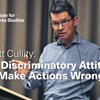permissive
Domain-specific tightness: Why is Sweden perceived as tighter than the United States?
Current research in ecological and social psychology, vol 3 Abstract The tightness of a society is defined as the strength of social norms and the degree of sanctioning within the society. However, a so
Sex Selection for Daughters: Demographic Consequences of Female-Biased Sex Ratios
Population Research and Policy Review 41, p. 1619–1639 Abstract Modern fertility techniques allow parents to carry out preimplantation sex selection. Sex selection for non-medical purposes is legal in m
The Liberal Social Values of Swedish Healthcare Providers in Women’s Healthcare: Implications for Clinical Encounters in a Diversified Sexual and Reproductive Healthcare
International Journal of Public Health Abstract Objectives:Women’s healthcare is a potential source of cross-cultural conflicts. Diverging values between healthcare providers and patients challenges the

Garrett Cullity: How Discriminatory Attitudes Can Make Actions Wrong
Research seminar with Garrett Cullity, professor of philosophy at the Australian National University, known for his research on moral philosophy. Abstract In general, otherwise permissible actions do

Garrett Cullity: How Discriminatory Attitudes Can Make Actions Wrong
Research seminar with Garrett Cullity, professor of philosophy at the Australian National University, known for his research on moral philosophy. Abstract In general, otherwise permissible actions do
Garrett Cullity: But Thinking Makes It So: How Discriminatory Attitudes Can Make Actions Wrong
Research seminar with Garrett Cullity, professor of philosophy at the Australian National University, known for his research on moral philosophy. Venue: Holländargatan 13, Stockholm Register here > Ab
Subsistence Emissions and Climate Justice
British Journal of Political Science Abstract The climate justice literature typically endorses a moral right to produce subsistence emissions, but this right appears problematic considering how urgent
Review of Elizabeth Barnes, The Minority Body: Theory of Disability
Oxford: Oxford University Press, 2016, pp. 224, £25. Ratio. doi:10.1111/rati.12151 What does being disabled mean for the disabled individual’s life? Does being a disabled individual have inherent negatregarding disability.
Katie Steele: The real paradox of supererogation
Katie Steele, Associate Professor, Australian National University. Abstract It is a feature of our ordinary moral talk that some acts are supererogatory, or beyond what is required. But ‘beyond’ in what
Asymmetry and Non-Identity
Utilitas, Volume 31, Issue 3, pp.213-230. doi.org/10.1017/S0953820818000341 Abstract In this article we distinguish two versions of the non-identity problem: one involving positive well-being and one inv








